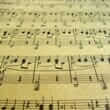Background
- Music has been used as a tool of healing since ancient times, appearing in the writings of the Greek philosophers Pythagoras, Aristotle, and Plato. Native Americans and other indigenous groups have used music to enhance traditional healing practices for centuries. References to music for healing have appeared in ancient Native American pictographs, African petroglyphs and other ancient inscriptions. Healing songs and music have also been passed down through oral traditions worldwide. Traditional Chinese medicine (TCM) practitioners have used music for healing. Traditional rÄgas ("melodic modes" used in classical music in India) have also been used to create different states of mind for healing.
- Some scholars believe that "modern" music therapy began in the mid-1700s, when Louis Roger wrote his "A Treatise on the Effects of Music on the Human Body." Others say that the modern discipline of music therapy began early in the 20th Century to treat recovering soldiers during and after both World Wars. Patients' responses led to growth of such programs and wider scientific curiosity about the possible clinical effects of music.
- Music has been used to influence physical, emotional, cognitive, and social well-being and improve quality of life for healthy people as well as those who are disabled or ill. Therapy may involve either listening to or performing music, with or without the presence of a music therapist.
- Music therapists are professionally trained to design specialized applications of music according to an individual's needs using improvisation, receptive listening, song writing, lyric discussion, imagery, performance, and learning through music.
- Sessions can be designed for individuals or groups based on the specific needs of the participants. People that support music therapy claim that infants, children, adolescents, adults, the elderly and even animals can all potentially benefit from music therapy.
- Music therapists work in many kinds of healthcare settings including psychiatric hospitals, prisons, rehabilitative facilities, medical hospitals, outpatient clinics, day treatment centers, agencies serving developmentally disabled persons, community mental health centers, drug and alcohol programs, senior centers, nursing homes, hospice programs, correctional facilities, halfway houses, schools, and private practice.
References
- Boso, M., Emanuele, E., Minazzi, V., Abbamonte, M., and Politi, P. Effect of long-term interactive music therapy on behavior profile and musical skills in young adults with severe autism. J Altern Complement Med 2007;13(7):709-712.
View Abstract - Bruer, R. A., Spitznagel, E., and Cloninger, C. R. The temporal limits of cognitive change from music therapy in elderly persons with dementia or dementia-like cognitive impairment: a randomized controlled trial. J Music.Ther 2007;44(4):308-328.
View Abstract - Hatem TP, Lira PI, Mattos SS. The therapeutic effects of music in children following cardiac surgery. J Pediatr (Rio J) 2006 May-Jun;82(3):186-92.
View Abstract - Hilliard RE. The effects of orff-based music therapy and social work groups on childhood grief symptoms and behaviors. J Music Ther 2007 Summer;44(2):123-38.
View Abstract - Holmes C, Knights A, Dean C, et al. Keep music live: music and the alleviation of apathy in dementia subjects. Int Psychogeriatr 2006 Dec;18(4):623-30.
View Abstract - Jaber S, Bahloul H, Guetin S, et al. [Effects of music therapy in intensive care unit without sedation in weaning patients versus non-ventilated patients]. Ann Fr Anesth Reanim 2007 Jan;26(1):30-8.
View Abstract - Kern P, Aldridge D. Using embedded music therapy interventions to support outdoor play of young children with autism in an inclusive community-based child care program. J Music Ther 2006 Winter;43(4):270-94.
View Abstract - Kwon IS, Kim J, Park KM. Effects of music therapy on pain, discomfort, and depression for patients with leg fractures. Taehan Kanho Hakhoe Chi 2006 Jun;36(4):630-6.
View Abstract - Leardi S, Pietroletti R, Angeloni G, et al. Randomized clinical trial examining the effect of music therapy in stress response to day surgery. Br J Surg 2007 Aug;94(8):943-7.
View Abstract - Liu RW, Mehta P, Fortuna S, et al. A randomized prospective study of music therapy for reducing anxiety during cast room procedures. J Pediatr Orthop 2007 Oct-Nov;27(7):831-3.
View Abstract - Ostermann T, Schmid W. Music therapy in the treatment of multiple sclerosis: a comprehensive literature review. Expert Rev Neurother 2006 Apr;6(4):469-77.
View Abstract - Rudin D, Kiss A, Wetz RV, et al. Music in the endoscopy suite: a meta-analysis of randomized controlled studies. Endoscopy 2007 Jun;39(6):507-10.
View Abstract - Sendelbach SE, Halm MA, Doran KA, et al. Effects of music therapy on physiological and psychological outcomes for patients undergoing cardiac surgery. J Cardiovasc Nurs 2006 May-Jun;21(3):194-200.
View Abstract - Silverman MJ. The influence of music on the symptoms of psychosis: a meta-analysis. J Music Ther 2003 Spring;40(1):27-40.
View Abstract - Talwar N, Crawford MJ, Maratos A, et al. Music therapy for in-patients with schizophrenia: exploratory randomised controlled trial. Br J Psychiatry 2006 Nov;189:405-9.
View Abstract







